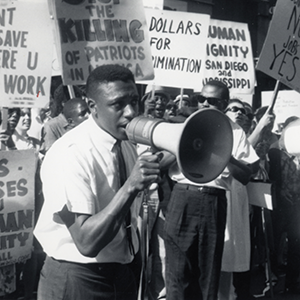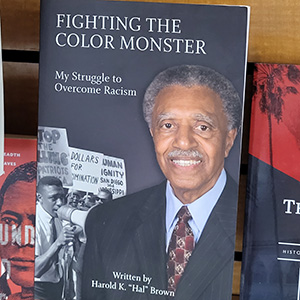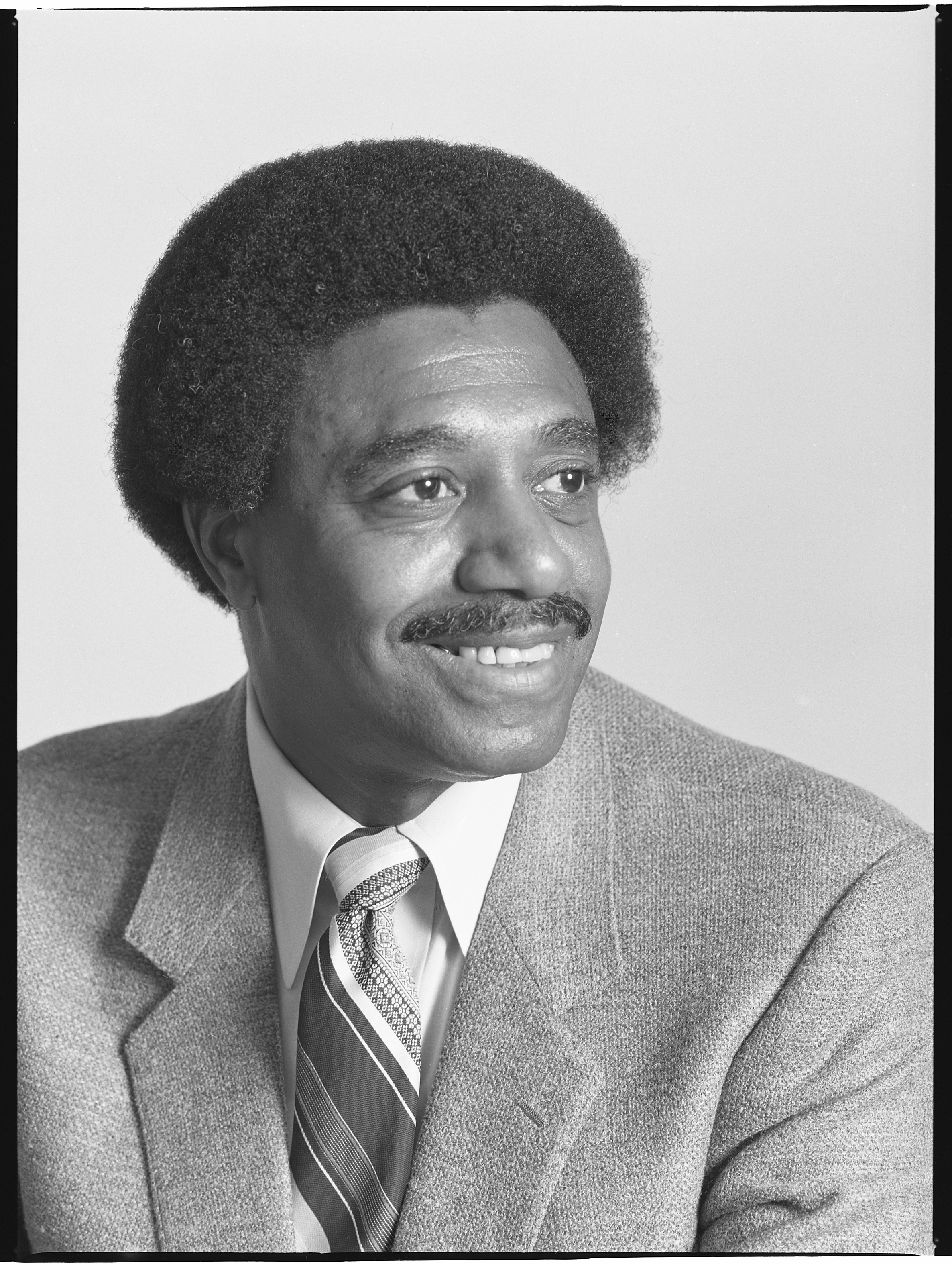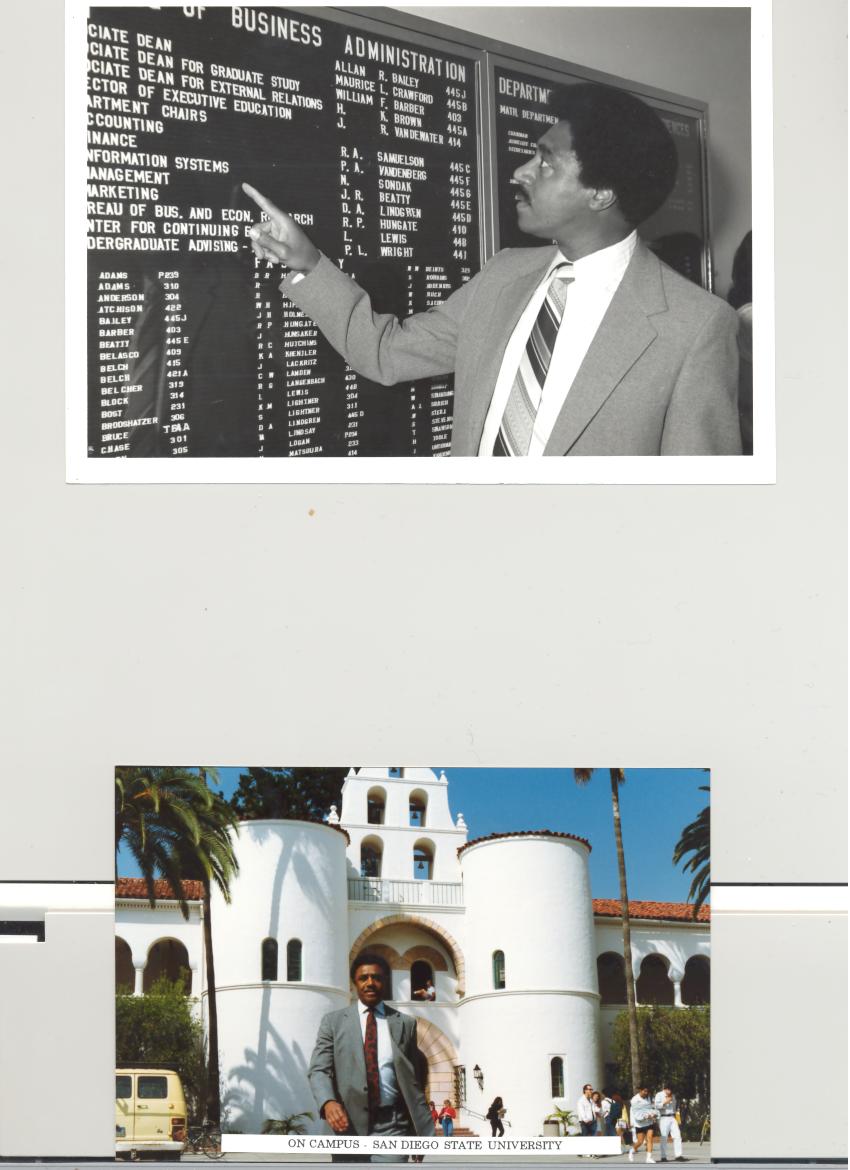Civil Rights Activist Hal Brown is Still Making an Impact Beyond SDSU
Whether he was in the role of a student, administrator or consultant, Harold (Hal) K. Brown has left a significant mark on almost every program and person he encountered during his many years at San Diego State University. As the first Black administrator at SDSU, Brown was a groundbreaker, activist, educator, role model, mentor and friend to many in the SDSU community and underserved members of the San Diego community.

Hal Brown (with megaphone) was a leader in helping to integrate residential neighborhoods in San Diego County in the early 1960s.
Brown first entered SDSU (then San Diego State College) as a student-athlete in 1953, but he left the university for two years after he was drafted into the U.S. Army. When he returned to the campus in 1955, he enrolled as a physical education major and resumed his athletics scholarship as a starting guard for the Aztecs’ basketball squad.
Getting His Start as a Voice for Change
Before he earned his degree in 1959, Brown had become involved in the civil rights movement through the university’s Wesley Foundation, which still maintains a presence at SDSU. At the time, the students within the organization went to different churches in the San Diego region to discuss race relations issues. This first foray into civil rights activism sparked a passion in Brown, prompting him to become a tireless advocate for racial equality to this very day. “The experience of growing up in segregated schools and back alleys really left a mark on me,” he said. “Being called the ‘n-word’ and being looked at as inferior has a negative effect on Black people and we never really talked about race relations in San Diego when I was a student.”
Seeing a need to be a voice for change, Brown ratcheted up his activism after graduating from San Diego State and becoming a junior high physical education teacher in the Claremont area of San Diego. He became involved in the Congress of Racial Equality (CORE) and fought to integrate residential neighborhoods in San Diego County in the early 1960s. It was during this time that he became interested in fostering economic development within San Diego’s Black community and — though he didn’t know it at the time — it would lead to an educational program that would be one of his proudest accomplishments.
Shortly thereafter, Brown left San Diego and moved to the East Coast where he worked as a banker and even spent time in the Peace Corps as the deputy director in Lesotho.

Brown’s book “Fighting the Color Monster” was published in 2019 and can be purchased at the SDSU Bookstore.
Return to San Diego State
After returning from Africa, he earned an MBA from Fordham University and started a career in the banking industry shortly afterward. While Brown was working in New York’s Financial District in 1971 and “missing San Diego,” he got a call from a friend letting him know that San Diego State was looking for someone to work in the university’s administration with the vice president of academic affairs. He jumped at the opportunity and made SDSU history in the process.
The First of Many Firsts
San Diego State offered Brown a position in the office of academic affairs, making him the first Black administrator in the university’s history. It was in this role that Brown was authorized by the university to take on the responsibility of establishing the Afro-American Studies program in 1972.
Since this was one of the first Afro-American Studies academic departments in the U.S., Brown recalls there were no guidebooks or roadmaps to follow — he used his grit, passion and determination to make the department a reality. “There were only two Black faculty members teaching at the university when I arrived and I asked them to include their courses the curriculum,” said Brown. “I then recruited and hired Black faculty members from across the U.S. to teach in the program as well.”
It is also believed that this was the first Black studies department in the nation to offer tenure and tenure-track positions to professors teaching and researching with any Afro-American Studies program. One of those early faculty recruits was a young professor who had just earned her Ph.D. from UCLA named Shirley Weber. Weber currently serves as California’s first Black Secretary of State.
By 1972, Brown was able to build the department to where it was able to offer a bachelor’s degree to undergraduate students. By 1975, the department set another milestone when Gary Ross Hargrave became the first SDSU graduate to earn a bachelor’s degree in Afro-American Studies. Since then, the program has continued to grow, and it is today known as the Department of Africana Studies in SDSU’s College of Arts and Letters. Thanks to Brown’s hard work and vision, the program celebrates its 50th anniversary in 2022.

Hal Brown in 1971, the year he returned in San Diego State as an administrator.
Working at the Business School
After Brown’s success in helping to establish what is now the Department of Africana Studies and SDSU’s first counseling program for Black students, he took on the role of director of the university’s information technology department for four years. But since advocacy and activism is his true calling, he continued to pursue those passions when he became the associate dean for external relations in SDSU’s College of Business Administration (now the Fowler College of Business) in the late 1970s.
As the college’s associate dean for external relations, Brown was responsible for establishing a relationship between SDSU’s business school and the San Diego business community. He was also responsible for developing the first formal fund-raising program for the college.
Within about 10 years, Brown’s responsibilities expanded when he and Lois Sisson, who headed the university’s personnel department (now human resources), developed the Study Commission on Black Affairs (SCOBA) which — among other activities — released a report detailing SDSU’s affirmative action program and served as a catalyst for change in the university’s hiring practices in the late 1980s. SCOBA honored Brown in March 1988 with the first Harold Brown Freedom Award which was named in his honor.
In the mid-1990s, Brown’s advocacy also led him to establish a certificate program within the college that was designed to economically empower those living in the underserved local community. The certificate program consisted of nine courses taught over an eight-month period that focused on accounting, marketing, leadership and other essential business skills. It was developed during the college’s AACSB accreditation process and the question was raised about what the college was doing for San Diego’s underserved populations. “Since I was interested in how economics impacted Black people since the 60s, the dean asked if I’d like to spearhead this effort,” said Brown. “Once I was handed the opportunity, it took me about a nano-second to say ‘yes’.”
“Harold was dedicated and extremely savvy about universities and institutions. He hired us all on tenure track, which was unusual for the time. This stabilized the department and laid a great foundation for the future success of Africana Studies from 1972 on. I thought about it over the years and have been extremely grateful for this decision.” - Shirley Weber, California Secretary of State and SDSU Africana Studies Professor Emeritus

These SDSU Del Sudoeste yearbook photos show Brown shortly after he became the associate dean for external relations is what is now the Fowler College of Business.
Point of Pride
After 26 years at SDSU, Brown retired in 1997, but he continued to work closely with the university and the College of Business as a consultant. It was as a consultant that he expanded his certificate program into the Center for Community Economic Development (Center for CED). In addition to directing the certificate program, the center worked with local governments and community leaders to provide resources and financial/economic outreach to the San Diego Community to improve opportunities for affordable housing, job creation and local business development. “Of all the things I’ve done at SDSU, I’m probably the most proud of developing the Center for CED,” said Brown. “That’s one of the things I cherish the most and it’s given me a lot of satisfaction.”
Brown left his consulting position at SDSU in 2004, but he continued to be honored for his influence and impact on the Fowler College of Business and on the university. In 2012, Brown was honored with the Alumni Awards of Distinction (formerly the Monty Award), which is the highest recognition accorded to SDSU alumni. Five years later, SDSU conferred an Honorary Doctorate of Humane Letters during the Fowler College of Business’ 2017 commencement ceremony.
Brown’s influence on the SDSU campus continues today. The SDSU library houses the Harold K. Brown Civil Rights and African-American Experience Collection which includes papers, photos, newspaper clippings and slides of Brown’s civil rights work both in the SDSU and San Diego communities. Additionally, Fowler alumnus, L. Robert Payne {’55, management) and philanthropist, Malin Burnham established the Hal Brown Career Learning and Understanding Biases program (HB CLUB) to further the success of SDSU’s Black students by enabling them to become future community and business leaders. The program is currently managed by the SDSU Office of Educational Opportunity Programs and Ethnic Affairs under the Harold K. Brown Knowledge, Education and Empowerment Program (KEEP) which supports the understanding of the history, importance of education, and economic systems of those within the Black community.

